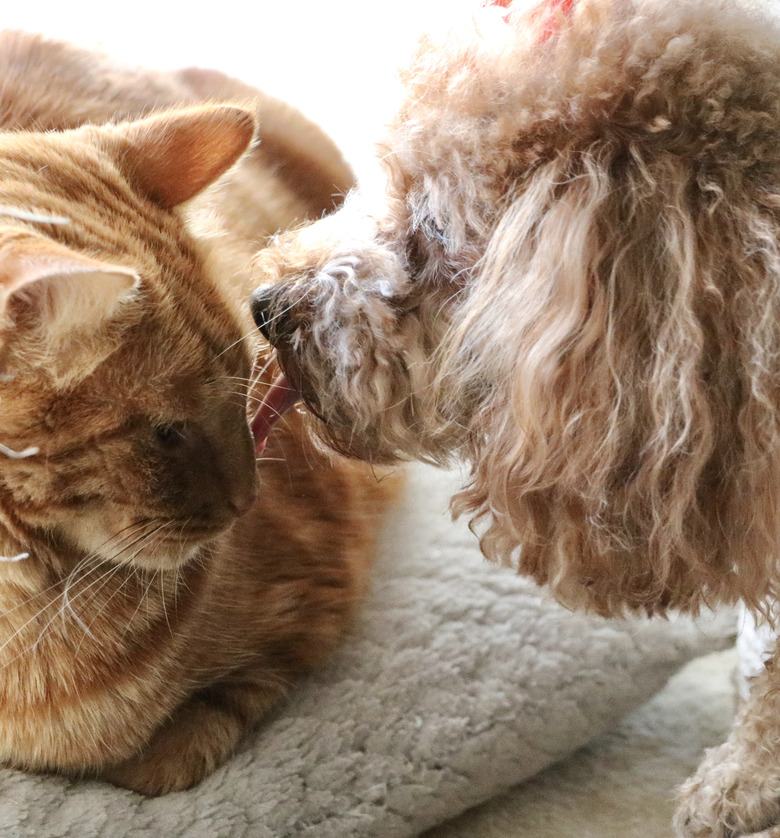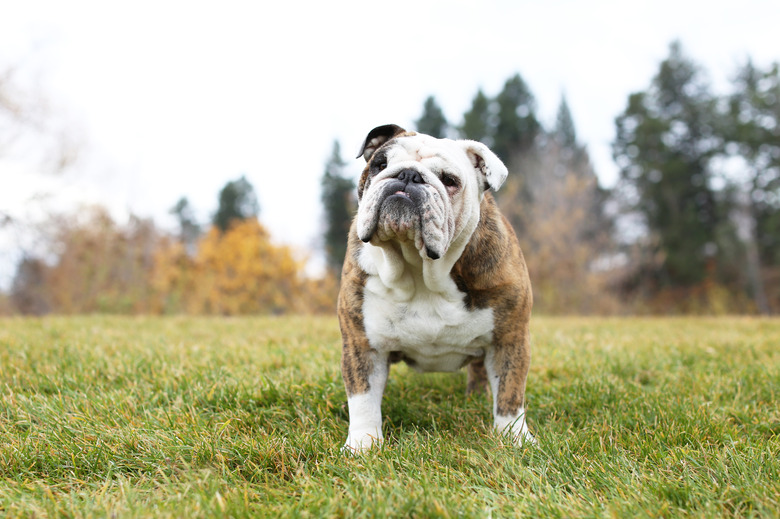Causes Of Swollen Lips In Dogs
You love your pup's sweet face, but when something's not quite right with it, it's cause for alarm. If your dog has a swollen lip, it may be from a tussle with another dog, cat, snake, or even an insect. Other potential causes of a dog's swollen lip include infection, dental disease, and tumors. The most common cause of a dog's swollen face is some sort of allergic reaction. It could be an allergic reaction to bug bites or snake bites, an allergy to something in their food, or a reaction to fleas.
Look for bites and stings on the dog's face
Look for bites and stings on the dog's face
Dogs are curious, busy animals, often following their nose wherever they lead. If your pup stuck their sniffer in the wrong place, they might have encountered a bee or a spider that took offense to their interest.
Bee stings and bites can cause a dog's swollen lip, and if your dog has a severe allergic reaction, their throat may also swell, cutting off their ability to breathe. It's important to note that any swelling around the face or neck should be examined by a veterinarian to make sure it won't compromise respiration. If the swelling expands and they have trouble breathing, that could be life-threatening so seek veterinary treatment immediately.
Swollen lips on a dog can also be a vital first sign of a potentially dangerous reaction. If they're suffering from an allergic reaction, antihistamines and steroids may be part of the treatment plan.
Oral growths may cause a swollen face
Oral growths may cause a swollen face
Cancerous and noncancerous growths can cause a dog's swollen lip too. Oral growths that can affect your dog's lips and oral cavity include oral papillomas, epulides, and cancerous tumors, such as malignant melanoma and squamous cell carcinoma.
If your pup has a tumor in their mouth, they'll likely have problems eating. Other symptoms include bleeding and an unpleasant odor. Whether benign or malignant, tumors require early treatment to stop the growth, though viral warts may disappear on their own. Any growth in your dog's mouth should be assessed by your DVM as soon as possible.
Sniff out dog dental problems
Sniff out dog dental problems
Dental problems can give your dog a swollen mouth or lips. An infected tooth will cause facial swelling as well as an unwillingness to eat, lethargy, pain, and depression. Severe gum disease and inflammation inside the mouth, such as ulcerative stomatitis, can cause inflammation of the lips.
Dental issues are painful, often showing symptoms such as a reluctance to eat, pawing at the mouth, bad breath, drooling, and blood-tinged saliva. Treatment depends on the condition and may include tooth extraction, dental cleaning, and antibiotics to clear up an infection.
Investigate infection from a dog injury
Investigate infection from a dog injury
In addition to an inquisitive nature, dogs love to sniff at anything that just might taste good. They also love to chew and can experience oral trauma from chewing sticks, rocks, plants, and other random items. That means they may latch on to something that is apt to cut their mouth, such as a sharp plant, resulting in inflammation and lacerations in their mouth. Other symptoms of a mouth injury include blood in their saliva, drooling, and bad breath.
Bites or scratches caused by a dog, cat, or other animal may result in an infected puncture wound or a deep tissue infection known as cellulitis. Sometimes, dogs are bitten by snakes because they often sniff with their nose close to the ground. Signs of an infection include swelling, redness, tenderness, and pain.
Keep in mind that any bite wound should be considered an emergency and should be immediately treated by a veterinarian due to the high chance of infection and abscess formation. You should also make sure to always keep your dog updated on their rabies vaccination. It's the law in most states and it keeps them protected from this deadly disease.
Can food allergies cause a dog’s swollen face?
Can food allergies cause a dog's swollen face?
Allergies to food can cause hives or face swelling, but you are more likely to see signs of itchiness, vomiting, or diarrhea. The most common cause of a dog's swollen face, outside of physical injury, is some sort of allergic reaction to a bite or sting or recurring skin infections. Facial swelling would be an uncommon reaction to fleas, although itchiness and rubbing the face can be a sign.
Clean the dog's deep lip folds
Clean the dog's deep lip folds
If your dog is a breed with deep facial skin folds or drooping lips and heavy jowls, such as an English bulldog or Saint Bernard, they may experience a skin inflammation known as lip fold dermatitis. The lips are prone to accumulating moisture within these folds, causing swelling, inflammation, a yeast infection, and foul odor.
Keeping on top of your dog's facial hygiene is important, meaning their lip folds should be cleaned once or twice a day with a mild hypoallergenic pet shampoo or commercial wipes designed for dogs. In addition, their mouth should be kept dry to keep moisture from collecting in the folds. In severe cases, deep facial folds may be corrected surgically.
Other causes of facial swelling in dogs
Other causes of facial swelling in dogs
Infectious diseases and other illnesses that affect protein levels in the blood can cause facial swelling as well, so it's important to get any dog with a swollen face or lips to your veterinarian for a physical examination.
For example, if your dog hosts the wrong tick, they can become infected with Rickettsia rickettsii, the organism causing Rocky Mountain spotted fever. In the acute stage, this condition carries symptoms such as fever, depression, loss of appetite, joint and muscle pain, and fluid accumulation in the face and legs. Timely veterinary treatment is necessary for a full recovery and requires antibiotic therapy. Other supportive care, such as fluid therapy, may be required depending on the dog's condition.
Most commonly found in West Highland white terriers and other terrier breeds (but can occur in other breeds of dogs) is a rare condition known as craniomandibular osteopathy, which causes swelling and abnormal bone growth in the jaw. The condition tends to develop in dogs less than a year old and includes other symptoms, such as drooling, reluctance to eat, and fever. It often stabilizes around the age of 1 year, and anti-inflammatories help to manage the associated pain.
The bottom line
The bottom line
If your dog has a swollen lip, it may be from a tussle with a dog, cat, snake, or even an insect. Other potential underlying causes of a dog's swollen lip include infection, dental disease, and tumors. Infectious diseases and other illnesses that affect protein levels in the blood can cause facial swelling as well, so if your dog's face or lips are swelling, they should be promptly examined by a veterinarian.


